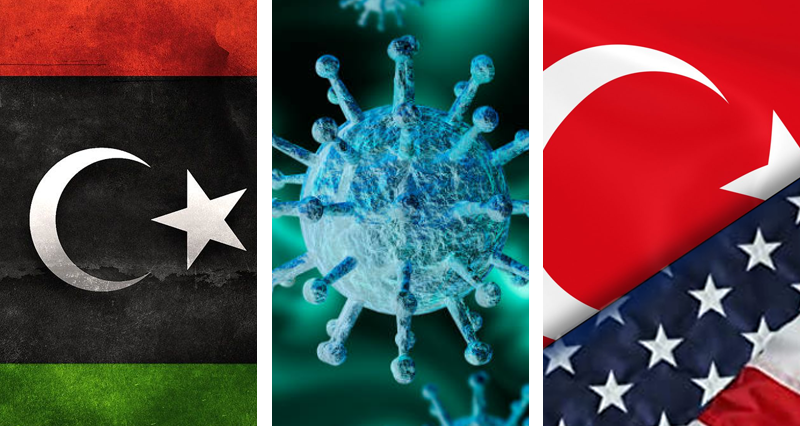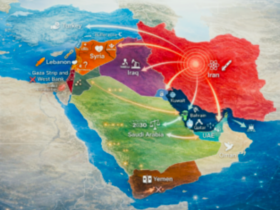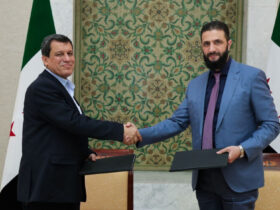Libyan instability and Haftar’s road to dictatorship
On April 27 after a series of pro-Haftar demonstrations in Eastern Libya and the appeal of Aguila Saleh Issa for the establishment of a new Libyan Political Agreement – Haftar declared himself the ruler of Libya, claiming to have accepted the mandate of the people. The GNA accused Haftar of the coup d’etat and the establishment of a dictatorship.
Erdogan has called for the international community to demand legitimate governance in Libya against the putschist Khalifa Haftar.
The radical and quick coup d’etat is characterized by Turkey as part of the UAE’s influence on the leader of the Eastern Libya.
The decision to force Haftar to declare himself the sole leader of Libya might be a result of problems with the realization of the offensive on Tripoli. In November 2019 Haftar declared that he would take Tripoli under control before 2020.
The UAE’s support for Haftar brings special risks for the control of power in the region. It’s worth noting that in November 2019 after signing 2 memorandums with Turkey, the GNA chose an orientation toward partnership with the anti-globalist power. The memorandum on maritime borders show the new geopolitical maritime block arising the the Eastern Mediterranean (Turkey-GNA, becoming an opponent to the UAE -Israel – Egypt – Greece block.
After Haftar declared himself leader of the country, new clashes between LNA and GNA broke out. On May 2, the GNA army struck LNA positions at the Al-Watiya airbase. On April 30, the GNA declared that 3 LNA airbases had been occupied by foreign forces (one of them being the UAE). “These bases are run by foreign countries to create chaos in Libya,” the GNA military spokesman Mohammed Qanunu said.
Coronavirus: lifting restrictions in the EU?
After almost 2 months of quarantine and isolation, the leaders of several EU countries started to discuss the next measures to prevent the spread of the virus as well as the methodology and steps for lifting the full isolation regime. In France, parliament proposed lifting the quarantine on May 11 and to starting a partial opening of cafes and restaurants. The opposition (Marine Le Pen and Jean-Luc Melanchon) criticised the proposal. At the same time, the lockdown has had a critical effect on European economics. At the end of April, some small shops were already being reopened in Germany and Austria.
The Turkish president declared that he will join efforts to create an EU-led fund for the development of the vaccine against coronavirus. Earlier, Erdogan underlined that Turkey today started to achieve the concrete positive results from its fight against coronavirus. The total number of deaths from coronavirus in Turkey is nearly 3 000, which is much less than in the US, Italy and Spain.
Türkiye bu sıkıntılı dönemi, istikbaline daha güvenle ve umutla baktığı bir motivasyonla geride bırakıyor.
Gücünü inancımızdan alan sabrımızla, millî birliğimizle, gelişmiş yerli üretim altyapımızla, örnek dayanışmamızla gösterdiğimiz fedakârlığın neticelerini almaya başlıyoruz. pic.twitter.com/o7PqXaZtl8
— Recep Tayyip Erdoğan (@RTErdogan) April 27, 2020
Anti-Turkish measures by the US: Syrian case
Despite the coronavirus crisis, tensions between Turkey and the US continue escalating in Syria. The official US commission charged with monitoring international religious freedoms has called on the US government to pressure Turkey to leave Syria.
On April 30, the United States declared their hope that Turkey would put pressure on terrorist groups, including Hayat Tahrir al-Sham in the Syrian province of Idlib. This was reported on Thursday by US Special Representative for Syria James Jeffrey during a video conference organized by the Washington Atlantic Council. Jeffrey also noted his hope that with Ankara’s help, Washington could deliver humanitarian aid to those in need in Idlib.
The US’ relationship toward Turkish activity in Syria seems to be somewhat two-faced: under the declarations of the common goal of establishing peace, the US continues to support Kurdish terrorists and blame Turkey for human rights violations of Kurdish separatists.
Kim Jong-Un
After a short absence sparked rumor and panic, North Korean Supreme Leader Kim Jong Un reappeared in public. American media sources like the New York Post and CNN had been reporting that Kim Jong-Un was ill and possibly dead.
Kim Jong Un appeared at the ribbon cutting ceremony of the country’s new fertiliser factory, once again drawing attention to foreign media’s tendency to fabricate stories and spread information about North Korea.

















Leave a Reply